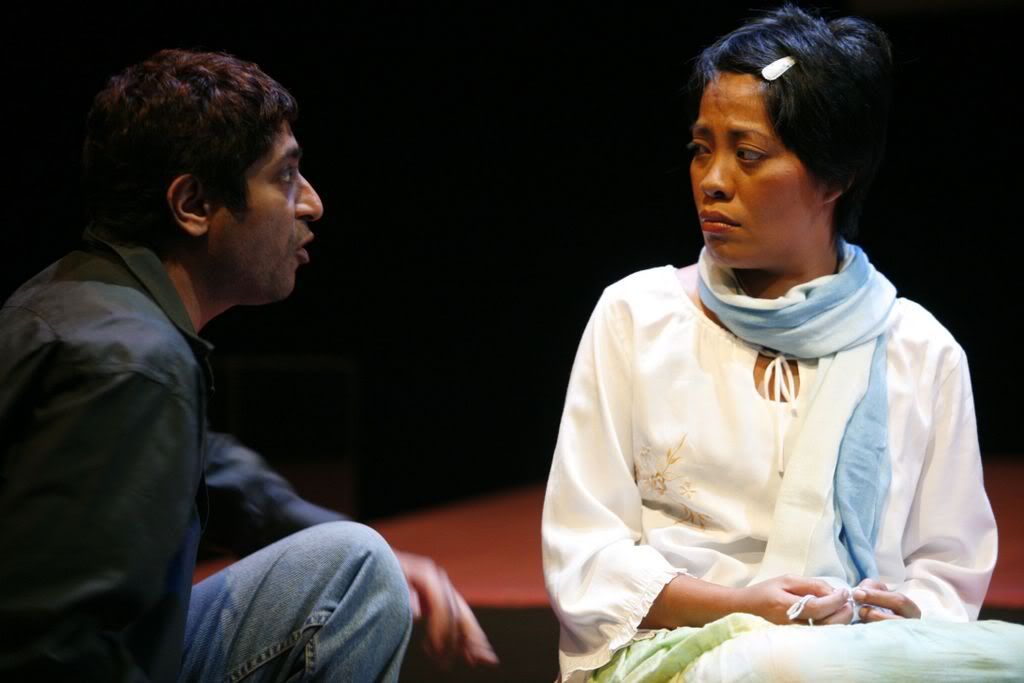Wednesday 30 May 2007
Shifting to a new site
I have shifted this blog to a new domain site of it's own at http://www.giftoflistening.com
The new site is still largely under construction (the pages under the navigation bar) though the blog entries will be updated regularly.
Pls do bookmark the new site instead.
Monday 28 May 2007
Flower power heals the green-fingered
Flower power heals the green-fingered
By Shelagh Mahbubani - Feb 15, 2007
The Straits Times
The healing power of plants is fast gaining recognition in Singapore.
While gardeners already know the calming influence of being in the yard, in the controlled environment of a hospital, it is called horticultural therapy. Studies worldwide have shown that gardening with a trained therapist can help patients learn new skills and regain those lost. Improved memory, initiation of tasks and attention to detail are recognised benefits, and patients also retrain muscles, improve coordination, balance and strength.
In the United States, for instance, horticultural therapy is already used in a wide range of rehabilitation services for cardiac patients, physical therapy and even for people serving prison terms.
And experts here also are giving it a thumbs up.
To read the full article, refer to the below linkhttp://health.asiaone.com.sg/mensmatter/20070216_003.html
Friday 25 May 2007
Minorities prefer depression counseling to drugs
Minorities prefer depression counseling to drugs
Fri May 18, 3:35 PM ET NEW YORK (Reuters Health) - When it comes to depression therapy, minorities are more likely than whites to prefer counseling to medication, according to a large U.S. survey
In an Internet survey of about 75,000 Americans, researchers found that African Americans, Hispanics and Asian Americans were two to three times more likely than whites to say they'd rather be treated with talk therapy than with drugs for depression.
Minorities were also less likely to believe that depression stems from biological changes in the brain and were more likely to think antidepressants are addictive, according to findings published in the journal General Hospital Psychiatry.
"This study documents that, overall, ethnic minorities hold attitudes toward depression and depression treatment that are distinct from those of white participants," lead study author Dr. Jane Givens, of Boston University Medical Center, said in a statement.
For the full article, refer to
http://news.yahoo.com/s/nm/20070518/hl_nm/minorities_depression_dc;_ylt=AhmQ_HnJahX8BUME13Ak0GXVJRIF
Thursday 24 May 2007
China ill equipped to treat mental health problems
Sat May 19, 4:31 PM ET
SHANGHAI (AFP) - Most Chinese who suffer from depression do not get proper treatment due to a lack of psychiatrists and public prejudice, state press reported Friday, citing the country's mental health professionals.
China has just 17,000 registered psychiatrists for its 30 million depression patients, only one-10th of the ratio in Western countries, the China Daily newspaper reported, citing figures from an industry meeting here.
The imbalance means 90 percent of people in China with depression do not get adequate treatment, according to health experts at the meeting.
"There are just too few doctors available," Hao Wei, vice-director of the Chinese Psychiatrists Association, was quoted as saying.
Moreover, public prejudice against mental diseases also deterred sufferers from consulting psychiatrists, with women and people in rural areas the most affected.
Many patients were reluctant to look for professional care and visited physicians instead on fear of prejudice, Hao said.
Many patients were reluctant to look for professional care and visited physicians instead on fear of prejudice, Hao said.
The economic cost of depression to China, in medical bills and lost employment opportunities, is nearly eight billion dollars a year, according to experts at the conference
For the article, refer to the below link
http://news.yahoo.com/s/afp/20070519/hl_afp/healthchinamental;_ylt=AnoJoKsan21SR5HIM1iyn_3VJRIF
Wednesday 23 May 2007
Schools have measures to detect psychosis among students: Lui
By Pearl Forss, Channel NewsAsia | Posted: 22 May 2007 1928 hrs
SINGAPORE: The recent massacre at the University of Virginia in the US prompted MPs to ask the Education Ministry about the measures in place to detect psychosis among students.
Minister of State for Education Lui Tuck Yew said there are three tiers of help.
The teachers will first identify problem behaviour.
The students are then referred to school counsellors.
Severe cases are referred to the Institute of Mental Health for expert help.
RADM (NS) Lui said: "In 2006, only 31 out of a total of 7,155 cases of schizophrenia - which is the most common form of psychosis - were diagnosed for patients aged under 18 years by the Child Guidance Clinic of the Institute of Mental Health.
"With regard to what happened in the University of Virginia, our institutions of higher learning actually have a system in place where there are people who are on the lookout for such developments."
He added that schools also have programmes to reintegrate students who have been treated for mental problems.
MP Halimah Yacob asked if schools have programmes to not only train counsellors and teachers but also raise awareness among students about the challenges and problems faced by psychotic students.
RADM (NS) Lui replied: "I think the areas that we are actually paying greater attention to right now would be dyslexia, autism, as well as, for example, other behavioural problems which I think are more common." - CNA/ir
For the article's source click below
http://www.channelnewsasia.com/stories/singaporelocalnews/view/277702/1/.html
Catching a cold
"The Chinese fear being called mentally ill. Actually it's like catching a cold." Actor Chow Yun Fat.
-------
Thoughts
I tried looking for the original source of the quote on the net but I just couldn't seem to find it anywhere.
Tuesday 22 May 2007
The men do get it
Pg 41
The men do get it.
But unlike women, men are no likely to admit they feel that way or seek help for their condition.
Joanne Yap
Joanne@mediacorp.com.sg
During his days in the army, product support coordinator Adrian Tan* caved under the pressure and stress of life in a camp and succumbed to depression.
One of his officers suggested that he consulted a psychiatrist, who prescribed anti-depressants to help Adrian cope with his condition. But due to the lack of funds, the medication dried up after his army days.
"I turned to taking off-the-counter cough syrup, as it was the only drug I knew that was cheap and sleep inducing. Over the years, the dosages I took increased, but it still didn't help my condition," Adrian said.
Contrary to the popular belief that depression mostly affects women, the reality is that men also suffer from it. In fact, 40 per cent of men aged between 40 and 60 will experience some degree of depression.
Dr Tay Woo Keng, senior consultant at the Division of Psychological Medicine at Changi General Hospital, explained:"The core symptoms of depression, such as having a depressed mood, a lack of capacity for pleasure and enjoyment, negative thinking and suicidal thoughts, are experienced by all patients regardless of sex."
The triggers of depression might be many and often include a combination of environmental, genetic and psychological factors. But while these causes are not uncommon among men and women who fall into depression, the similarity ends there.
While women tend to be more open about discussing their condition and seeking help, men often act out their feelings of hopeless and helplessness instead, through anger or working long hours.
In Adrian's case, he shield away from those around im, preferring to be on his own. "I find it difficult to communicate what I'm feelnig to others, so I don't share my thoughts very often. When I felt down I kept to myself instead."
The symptoms of depression that manifest in men are different from those typically diagnosed in women and are hence harder to recognise and diagnose.
According to Dr Tay, men tend to show depression through hostility, irritability or aggression. "Men tend to cope with their depressed feelings by drinking, taking drugs or engaging in risky acitivties like dangerous sports. They might even atttempt suicide."
As many as 80 percent of people who seek help for depression find relief through therapy or medication, but the problem remains that not many men come forward.
Dr Chua Hong Choon, senior consultant, head of general psychiatry department at the Institute of Mental Health, said :"men don't usually cry, show sadness and loss of will or verbalise an intention to hurt themselves. As a result, their depression is hidden from caring friends, family members and associates who might insist that they seek help."
According to Dr Tay, men's reticence could stem from societal and cultural expectations put on them to fit a certain mould - to be in control, tough and successful in dealing with advesities.
"Thus, men often restrain their emotions. They do not express their depression freely or ask for help, as this is perceived as a sign of weakness."
Treatments for depression include antidepressant therapy, medication or psychotherapy, which involves counselling. In addition, cognitive therapy (a form of psychotherapy) may also help in treating mild to moderate cases.
Those who are depressed tend to have a pessimistic outlook on life - and these negative thoughts become automatic and habitual over time. Therapy aims to get individuals to recognise these thoughts, challenge them and replace them with more realistic and accurate ones.
In cases of mild depression, exercise may help chase the blues away, Dr Tay advised those with depression to talk about their condition, spend time with others, keep active, write down the thoughts that trouble them and be patient with themselves as recovery is seldom achieved overnight.
For more information about male depression, call the Institute of Mental Health at 6389 2833
*Name has been changed at the request of interviewee
The site itself
I urge those who wish to help those who's suicidal to read through them now rather than wait till the need arises.
Over the next 1 to 2 weeks, I will add more categories to the link portion, including links related with Post-trauamatic stress disorder (PTSD), obsessive compulsive disorder (OCD), Multiple Personality Disorder and eating disorders (anorexia and bullimia) among other things hopefully.
For those with feedback and suggestions (about the site or otherwise), pls leave me a comment or drop me an email at listeningfromtheheart83@yahoo.com
Also, I am looking for anyone who's going through or has recovered from mental illness who has a flair for the arts, someone who can draw well basically. I wish to see if any such individual is willing to volunteer and help with some ideas i have in mind for the site. Again, drop me an email if you are such a person and are interested.
Monday 21 May 2007
Thoughts on Off Centre
I don't usually watch plays and I made this an exception due to the theme itself as I went to watch the play with my friend yesterday. I enjoyed the play a lot, the play lasted 1 hour 50 minutes, but I could have easily continued watching it for another 1 or 2 hours. Perhaps it's due to the fact that the theme is close to my heart, yet, without a realistic protrayal of the social situation and connection I could feel with the characters themselves, how would I have been able to enjoy it so.
While watching the show, I dare say a tinge of sadness and pain was felt because I know for myself how true and real the prejudices and the emotional and mental confilcts, and more importantly the struggles and fears that the characters face, for in the 2 characters Vinod and Saloma, I also see in them the cries and faces of some people that I know.
Vinod protrayed just how what depression supposedly is, "anger turned inward." His anger and frustrations, hidden in his fears. The seemingly stable but yet more fragile than the very girl he tried to befriend
Saloma on the other hand outwardly looks mentally and emotionally frail, yet in her, I see the courage and strength that she has deep down. Just like a friend of mine that I know who also suffers from schizophrenia coincidentally.
Emily, Saloma's friend in the play, despite how the character's manner of talking is understandably funny to most public, it brings about a sense of sadness again knowing that people like Emily truly do believe what they say and think. Delusions of grandeur.. bipolar disorder if im not mistaken.
There are several other characters I enjoyed watching in the play, among them would be Vinod's platoon seargant (not the captain mind you) who protrayed just how their fellow peers are also in a state of helplessness themselves, unable to rise against those above them in rank in the army, and not knowing how to truly help people like Vinod.
It thoroughly annoyed my friend and I that some people in the audience were constantly laughing, annoyed in the sense that I feel sad for these people in the audience who despite seeing the play, is clearly completely out of touch and unable to connect with the depth of pain and struggles the characters are going through.
I saw and recognised in the play, the loving yet denial state and lack of understanding parents some mental illness sufferers had to face, the harshness of NS which so often lacks a human heart, the fears and struggles mental illness sufferers go through, the fear and prejudice of the majority public, and the co-dependent but genuine friendship that Vinod and Saloma share. In their friendship, I saw the neediness of both, and in the progress, the abandonment and fearful feelings that Vinod must have felt.
At the end of the play, Saloma sitting there, to me protrayed the aloneness that mental illness sufferers face, and how we could all so easily take the time not to judge and be there with them and that alone could have helped and meant so much to them. We are all too busy as Saloma puts it, too busy with our lives, unable to spend a moment to care. I sat there with my friend watching the audience depart at the end of the play with Saloma sitting there waving goodbye, and I wonder, just how much did the audience truly understand what Vinod and Saloma (and all the other mental illness sufferers out there) had to go through.
Going green could beat the blues: British experts
Going green could beat the blues: British experts
Mon May 14, 5:26 AM ET LONDON (AFP) - A walk in the country is an effective alternative to chemical anti-depression treatment, a leading mental health charity said Monday, calling on British doctors to prescribe outdoor activities.
The Mind charity said so-called "ecotherapy" could help millions of people with mental health problems after two studies it commissioned suggested it could have significant benefits for sufferers in most cases.
Prescription of care farms as a treatment has been highly successful on mainland Europe, but Britain has failed to follow the example, it added as it launched a report "Ecotherapy: the green agenda for mental health."
Mind chief executive Paul Farmer said: "Mind sees ecotherapy as an important part of the future for mental health.
"It's a credible, clinically-valid treatment option and needs to be prescribed by GPs, especially when for many people access to treatments other than anti-depressants is extremely limited."
Researchers from the University of Essex, eastern England, studied the effect of a 30-minute walk in a country park compared with one in an indoor shopping centre on a small sample of 20 people with mental health problems.
It found that 71 percent reported decreased levels of depression and anxiety after the outdoor walk while 90 percent said their self-esteem increased.
For the full article refer to
http://news.yahoo.com/s/afp/20070514/hl_afp/lifestylebritainhealth;_ylt=AmLY9FEKxisQmZ_HfdzveCrVJRIF
--------------
My thoughts.
A good walk, breathing in the fresh air and sunshine always works wonders.
Friday 18 May 2007
1 in 4 teens and young adults could face mental problems
Prime News
Experts to help IMH identify symptoms early, start treatment
A MAJOR effort is under way to identify the symptoms of mental problems and start treatment early.
This comes in the face of findings which show that one in four teens and young adults here and in other developed countries could have psychological problems.
The Institute of Mental Health (IMH) has invited nine experts, both foreign and local, to help it develop a study to see how this can be done.
The hope is that this will help prevent the onset of serious diseases such as schizophrenia
One expert on the IMH panel, Associate Professor Alison Yung of Melbourne University, said: 'If we can pick them up early, we may not even need medicine to help them.'
The concern stems from studies conducted internationally - covering several developed countries, including Singapore - which have shown that 25 per cent of those in their teens and early 20s suffer from mental problems such as anxiety, depression, anorexia, psychosis and personality disorder.
For most, the problems are transient. But 10 per cent are at risk of serious long-term psychosis - or mental problems such as schizophrenia, hallucinations and delusions.
This means that going by Singapore's population growth rate, 1,000 babies born here each year could end up with serious psychological problems.
In 20 years, some of them may join the 5,300 patients warded at the IMH last year for psychosis - adding to the strain on available funds.
Already, about a third of the $40 million from Medifund, the government kitty to help the poor pay health-care bills, goes to IMH patients each year.
Grasping the extent of the problem, Associate Professor Chong Siow Ann, who heads the IMH's Early Psychosis Intervention Programme, invited the nine experts to help.
A panel member, Associate Professor Richard Keefe of Duke University in the United States, said that most serious mental illnesses hit people in their teens or early 20s - when the brain's frontal lobe is developing.
He explained: 'This is the area that helps you plan, organise, strategise - all the high-level processing. It is important in controlling behaviour and emotion - which adolescents struggle with.'
His explanation is borne out by the age range of the IMH's psychotic patients, many of whom were warded between the ages of 22 and 26.
Half of the IMH's 32,000 outpatients are also being treated for chronic schizophrenia.
Schizophrenia, one of the more serious forms of psychosis, makes patients hear voices or believe that others are reading their minds or controlling their thoughts.
Treating schizophrenia early is crucial, said Professor Patrick McGorry of the University of Melbourne. 'After a couple of years, it becomes relatively permanent, and treatment at that point is largely ineffective.'
Prof Chong hopes to get the IMH study off the ground towards the end of this year, once approval and funding is obtained.
Duke University's Prof Keefe described Singapore as an ideal place for such a study. The country is 'compact and structured', and it is easier to follow up on patients, unlike in the US, where people move around a lot.
salma@sph.com.sg
Thursday 17 May 2007
Photos from the Off Centre play
Saloma: My social worker said I must come here. Rose. She always visit
me.
Saloma [Narrator]: Saloma looked at Vinod and...and smiled. What else
could she do?
She liked him. He was crazy.
Saloma: Must take. If not cannot become well. You take or not Vinod?
Saloma: You can go back. I know you very busy. Got a lot of work to
do. So, you can go back.
Saloma
Mak: Saloma, today is Friday. Today what we do? Asap rumah kan? See,
I put that
there OK? Dengar tak? Nak dekat Azan.
Mr Alvin was very gracious and kind to send me these nice photos of the play itself to post up.
All photos belong to and are credited to "The Necessary Stage"
Wednesday 16 May 2007
Straits Times Life! (15th May 2007) and TODAY's (14th May 2007) review of Off Centre
Life! - Life Arts
Off Centre is right on
Adeline Chia, ARTS REPORTER
432 words
15 May 2007
Straits Times
English
(c) 2007 Singapore Press Holdings Limited
OFF CENTRE The Necessary Stage Esplanade Theatre Studio Last Saturday
FIRST performed to rave reviews in 1993, Off Centre by The Necessary
It has been revived by playwright Haresh Sharma this year to mark two
Fourteen years on and with so many expectations riding on its back,
On one level, the story is a timeless one about the complex
He meets Saloma (played sensitively and with much pathos by Mislina
And by sheer craft and sensitivity, the script is a gem which tackles
The darker elements haven't lost their ability to shock and to move
The way in which a clothes hanger featured in a brutal, humiliating
There were also aspects of the play which were quaintly dated, although
In a way, it was apt that director Alvin Tan kept these references, as
Off Centre still strikes a raw chord 14 years after it was first
It remains one of the play's piquant ironies that its relevance
the day of Off Centre's expiry date.
chiahta@sph.com.sg
TODAY's review
Still Off after all these years
260 words
14 May 2007
TODAY (
English
(c) 2007. MediaCorp Press Ltd.
IT SHOCKED 14 years ago, but the re-staged play Off Centre seems a tad
mild in today's context.
You can pick out what could have been taken as shocking for local
The play sparked controversy when it was first staged due to what was
But this restaging reminds us of how much has changed since the early
Both Sharma and director Alvin Tan have chosen not to tamper with the
It would have been interesting to see the play updated for our times,
What we can do to fight stigma and help those who are mentally ill
1) The first and foremost is to understand and educate ourselves on what mental illness is about. What it means to those who go through mental illness.
That however as I mentioned in my previous posts isn't enough.
2) Reach out to those going through mental illness. Don't judge. Learn what it means to truly listen and empathise. Offer them the gift of your listening and understanding. Don't try to fix them or offer advice. Simply listen to them and understand.
Practice makes perfect.
"The way of being with another person which is termed empathic means temporarily living in their life, moving about in it delicately without making judgments.... To be with another in this way means that for the time being you lay aside the views and values you hold for yourself in order to enter the other's world without prejudice...a complex, demanding, strong, yet subtle and gentle way of being."
Carl Rogers
3) Learn what it means to truly listen. Practise how to listen.
Reassuring someone isn't the same as listening.
4) With every opportunity possible, do what we can to help speak out against the stigma against mental illness sufferers. Many mental illness sufferers are afraid to voice out their condition, you'll be surprised who may admit to you they are going through such a condition or know of someone close to them who does if you speak out and show acceptance for them.
5) Naturally, don't join in the bandwagon on calling mental illness sufferers as "siao", "psycho" or "crazy." It's rude, discriminating, insensitive and downright unkind.
Don't call those people who self-harm as attention seeking. Most people don't realise that self-mutilation for instance may be the person's way of coping, however dysfunctional others may see it.
And don't call those people who are considering, or attempted or commited suicide as "cowards."
Don't judge.
The kindest word in all the world is the unkind word, unsaid. ~Author Unknown
6) Have faith in them. Believe in them. Help them and help yourself understand that it is going to take time for them to recover, but they will (recover). Whatever they're going through, "It will pass in time." The important thing is, you must believe it yourself in your belief in them
"Treat a man as he appears to be and you make him worse. But treat a man as if he already were and what he potentially could be, and you make him what he should be." - Johann Wolfgang von Goethe
7) When they are slow in their recovery or in their signs of progress, or those who are grieving be patient with them. Don't rush them. Don't try to set datelines in saying/thinking that they have grieve/depressed enough. Let them move at their own pace.
Any frustration at their lack of progress stems from our own impatience. Work on our impatience instead and learn to be patient. Be patient with ourselves and be patient with them. Encourage them, don't give up on them.
"Patience makes lighter what sorrow may not heal." - Horace
8) There is a stigma against the male gender on that men shouldn't cry. If people are in pain and they wish to cry, let them, don't deny them that, male or female. The ability to cry is part of what makes us human
"But there was no need to be ashamed of tears, for tears bore witness that a man had the greatest of courage, the courage to suffer." - Victor E. Franklin
9) Don't say things like "they shouldn't feel this way."
Acknowledge their feelings. Do not invalidate their feelings.
Feelings are facts to the person experiencing them.
10) Don't give up. We are human beings, flawed in our own ways. We may make mistakes everyday in our effort to combat stigma or in reaching out to others. What matters is that we continue to learn from the mistakes we make.
Understanding and the art of listening can be learnt and acquired.
With every mistake, humility can be acquired. And with humility, the better understanding and empathy we can extend to others.
Be kind. Everyone you meet is fighting a hard battle - Plato
Tuesday 15 May 2007
Off Centre Post Event Talk – About Schizophrenia

This event and news is taken from SilverRibbonSingapore's website at
http://www.silverribbonsingapore.com/news.htm
Off Centre Post Event Talk – About Schizophrenia
22 May 2007
Institute of Mental Health
Lecture Hall
Free Admission
*First-come-first serve basis.
To register at info@silverribbonsingapore.com
Join the following speakers to understand more about Schizophrenia!
Dr Lim Choon Guan
Psychiatrist, Institute of Mental Health
Mr Alvin Tan
Founder/Artistic Director, The Necessary Stage
Mr Haresh Sharma
Resident Playwright, The Necessary Stage
Mr Harris Ng
President, Association for The Open Mind
Dr Rita Goh
Founder, Aspiron Services
Monday 14 May 2007
Problems mental illness sufferers face
Stigma being the most obvious and main problem that mental illness sufferers face, there is a list of other issues and obstacles that they have to overcome, which includes but not limited to,
a) Fear of ending up in hospital or IMH. The Institute of Mental Health (IMH) or formerly known as Woodbridge Hospital, carries with it its own stigma.
b) Medication and treatment. Its' costs and the amount of medication they have to take.
c) Suicide. Voicing out their suicidal thoughts.
d) Denial from family, love ones and friends
My own brief thoughts and opinions based on the observations I notice of the above points.
a) I feel that most mental illness sufferers are finding it difficult to accept that they are mentally ill. It is even harder when one realises they may at some point end up in IMH if they are not coping for IMH carries a stigma of being a hospital for the "insane". Naturally that's not necessarily true, yet the perception is there. The fear of hospitals/IMH is very real.
b) Medication for the mentally ill do not come cheap. And unlike a flu or a cough, the medication has to be taken for a minimum of a couple of weeks and for some, it may last a life time. A mental illness is a serious illness that takes a toll on the financial status of the individual. It takes a very severe toll on the financial status of those who's trying to pay off their treatment bills alone. This sometimes results in working adults who's suffering from mental illnesses fearing of losing their job as they would not be able to support their family or pay off their treatment and medication bills, and find themselves having this added to their stress and unable to cope well when they need a break.
For those who are seeking a job, the mental illness stigma prevents them from finding a job easily and often, this also may mean that they have an extra personal reason not to continue with medication thus hindering their recovery.
Another point to note, taking the medication itself is already awful as it is. Imagine having to take several pills everyday for an unknown period of time. It is nothing short of distressing for some of them.
c) The suicide stigma adds further havoc to the lives of those mentally ill. Mental illnesses may result in suicidal thoughts and when those who are on the brink of ending their life is crying out internally for help, they often find themselves facing judgemental words from others, thus finding their pleas for help ignored, judged or invalidated.
There are often very few people who can remain calm and level-headed and yet treat it seriously when listening to the suicidical thoughts and words of those who's feeling helpless and hopeless. This means that those mental illness sufferers who have suicidal thoughts have precious few people if any at all to turn to.
Also, the fact that their doctors (be they psychologists or counselors) are required to breach the term of confidentality if there's a serious danger of the client posing a threat to themselves, mental illness sufferers, especially the younger ones, find themselves afraid of the possibility of their parents finding out.
Nobody wishes to see a suicide note of someone we care and love and knowing that the person has departed from our lives. Yet, it is a sad fact that that's what happened to too many people.
More can be done and should be done to understand how we can help them.
d) Due to a lack of understanding, some mental illness sufferers find themselves in a situation where their parents or love ones do not acknowledge the fact that they are going through a problem. They believe that the mental illness sufferer is actually fine and that there's nothing wrong with them. This effectively in my view shuts down an avenue of support for the mental illness sufferer and creates another front where the individual has to cope with.
At the end of the day, too few have champion the cause, and even fewer still have stood up who have recovered from it themselves
It is very limiting to maintain the status quo. For years countries all over have tried to fight stigma by educating the public through various ways. Yet progress has been painfully slow. I see plenty of workshops educating the public on mental education, I see no workshops dedicated to working on fighting stigma.
My opinion is that the status quo simply maintains the position of "we have the help you need, come to us and we'll see to it that you get treated." That is not a proactive stance.
Simply knowing a brief understanding of what mental illness constitutes is not sufficient to fight stigma.
What can we do more to help?
Friday 11 May 2007
Nearly 7 in 10 kids exposed to trauma by age 16
By Anne Harding Wed May 9, 3:23 PM ET
NEW YORK (Reuters Health) - While exposure to traumatic events among children and teens is "almost commonplace," only a small fraction of young people will go on to develop post-traumatic stress disorder (PTSD) after such exposure, a new study showsBut the findings shouldn't be interpreted to mean that kids don't suffer after a trauma, Dr. William E. Copeland of Duke University Medical Center in Durham, North Carolina, the study's lead author, told Reuters Health. While children exposed to a single traumatic event did seem to fare well, those exposed to two or more such events were at higher risk of developing post-traumatic stress symptoms, as well as psychiatric disorders such as depression and anxiety.
For the full article, refer to the below link
http://news.yahoo.com/s/nm/20070509/hl_nm/kids_trauma_dc;_ylt=At.3_d481IYCZ5zBN39LN9fVJRIF
Thursday 10 May 2007
Eating disorder? Genes to blame too
Eating disorder? Genes to blame too
By Judith Tan - Mar 28, 2007
The Straits Times
The common perception of anorexia and bulimia sufferers is that they have brought the problem upon themselves by trying to get a fashionably slender figure.
But the causes of eating disorders among young girls and women are far more complex.
Researchers have found that genes seem to play an important role in determining who is vulnerable. It is much like the link between smoking and lung cancer, said Dr Blake Woodside, a psychiatrist at the University of Toronto.
'Not all smokers develop lung cancer. There is a genetic risk factor for smoking-linked cancer. Similarly, not all women exposed to the ideal of being fashionably thin develop eating disorders,' he said.
True, society's obsession with attaining what it perceives to be an ideal body is a contributing factor, which is why 'we get overly concerned with our weight and diet'.
'Yet less than 0.5 per cent of all women develop anorexia nervosa. This points to the fact that that societal pressure is not the lone cause,' he said.
To read the full article, refer to the below link





